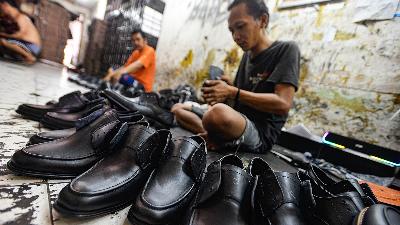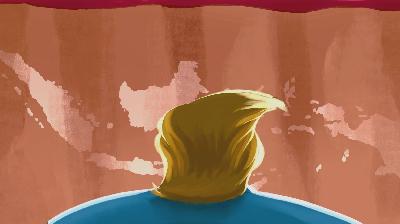Loopholes in Debt Write-Offs for Small Businesses
Monday, November 18, 2024
The government writes off non-performing loans of fishermen and small business owners. Detailed criteria can prevent moral hazards.
arsip tempo : 174677127968.

THE decision by the government to write off non-performing loans (NPLs) for small businesses with state banks and funding institutions could revive stalled micro businesses. This policy is contained in Government Regulation No. 47/2024 on the writing off of NPLs for micro, small and medium-sized enterprises (MSMEs) signed by President Prabowo Subianto at the beginning of November.
The writing off of NPLs is an appropriate mechanism for private sector financial institutions. However, managers of state-owned banks have been avoiding writing off NPLs because they are worried about accusations of causing losses for the state. As a result, trillions of rupiah of NPLs to small businesses have for decades been a running sore for banks despite having been removed from the books because they had been recorded as losses.
According to the government, there are at least Rp2.49 trillion in loans to 227,000 debtors under the government credit program that can be written off. Meanwhile, the total loans from commercial banks are Rp54.67 trillion.
As well as causing problems for banks, these NPLs mean small businesses have poor credit records. They no longer have access to funding from banks or non-bank financial institutions. As a result, these small businesses, that are the cornerstone of the Indonesian economy for lower income people, have stagnated. Moreover, these NPLs mostly come from government programs that have already ended, such as the Candak Kulak Credit, Small Investment Credit and Permanent Working Capital Loan programs, which mostly lent money to fishermen, farmers and small traders.
Unlike the big tycoons that were able to benefit from debt reduction through restructuring of their loans, small traders received no such assistance. They were only able to obtain similar facilities after the Financial Services Authority implemented a restructuring of MSMEs during the Covid-19 pandemic in 2020.
The Covid-19 pandemic provided a valuable lesson that the government’s affirmation of small businesses can revive a stalled economy. Small-scale businesspeople received a boost after their loans were written off. However, this writing-off must be a lesson for those providing credit for small-scale businesses in the future.
Nevertheless, the writing off of NPLs still requires caution. The government must organize the criteria for NPLs according to their context, because there are entrepreneurs that have been reluctant to pay their debt from the outset, and also fishermen or small businesspeople in arrears because of problems with their businesses. Data and verification of non-performing loans will determine the credibility of this policy.
Moreover, the Rp500 million maximum limit on loan write-offs can be dodged by unscrupulous entrepreneurs by dividing their loans so they are still categorized as MSMEs. The government needs to exclude business owners with this kind of attitude from debt forgiveness.
Banks also need to confirm that the loan write-offs for small businesses is not President Prabowo’s flagship program, especially since it has been explained that it is actually a program from the National Solidarity Movement, a volunteer organization established a few months ago. The writing off of loans for small businesses is mandated by the Financial Sector Development and Strengthening Law, which was passed in January 2023.
To avoid any traps in the policy of writing off small business NPLs, the government and financial institutions must provide detailed rules. Details and transparency are the keys to ensuring that this policy does not end in conflicts of interest or even an excuse to forgive the non-performing loans of cronies of the government.











